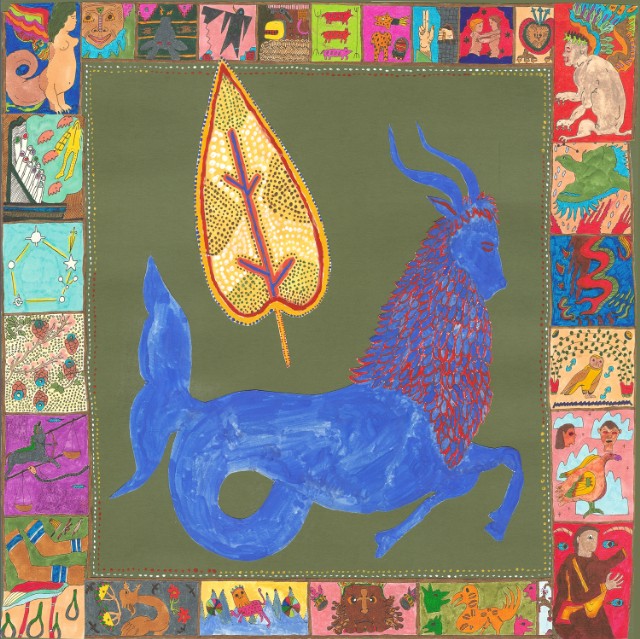Janus is the third album from LA-based songwriter Matt Kivel. It’s the follow-up to previous albums on Olde English Spelling Bee and Woodsist. Kivel’s sound is clearly built upon folk music, although he brings adaptations and flourishes all of his own, as well as employing a cast of over eleven other musicians who each add their own touches and improvisations. What could have been a relatively simple album is therefore transformed into something else entirely, a nuanced and convoluted synthesis of folk, pop and experimental jazz. One thing for sure, Janus is certainly not rustic and gritty back-porch folk. Kivel’s vocals are soft and smooth, sounding like a sad-at-heart poet from a snow-swept Greenwich village in a different era.
The other instrumental figure in the birth of Janus was Glasgow folk musician Alasdair Roberts, who accepted an unsolicited proposal from Kivel to produce the album, the start of a close professional and personal relationship. Kivel eventually travelled to Glasgow to record the album with Roberts at Green Door Studios. It is perhaps Roberts’s voice then that you can hear briefly at the beginning of the opening title track, a soft and vulnerable acoustic ballad that introduces not only Kivel’s gentle vocals but also the other instrumental embellishments with a gathering crescendo around the three quarter mark.
[soundcloud url=”https://api.soundcloud.com/tracks/206559954″ params=”color=ff5500&auto_play=false&hide_related=false&show_comments=true&show_user=true&show_reposts=false” width=”100%” height=”166″ iframe=”true” /]
‘Violets’ has a touch of country twang and a squealed guitar solo finale, and was purportedly influenced by a documentary Kivel watched about the West Memphis Three, a trio of teenagers alleged (and since released owing to new evidence) to have carried out satanic murders in 1993. In a feature with Interview Magazine, Kivel talks about how he thought a lot about how those types of True Crime stories have a dark, seemingly magnetic pull on us, and what that says about our characters. Next up ‘Pyrrha’ is all acoustic guitar and shuffling percussion and sleepy-sounding horns, all pinned together with Kivel’s lovely croon, while piano steps to the fore on ‘Prime Meridian’, a track which sounds somehow candle-lit and has several weird jazzy outbursts, when it sounds like the tumbling shadows grow claws and begin to move around on their own. ‘No Return’ returns to quivering, melancholy folk.
“‘There is no God he said’
and I didn’t mind.
Then you looked at the sky
and found nothing for me”
‘Janice’ follows suit, before ‘Jamie’s’ takes a darker turn, a bleak song in which the title character comes out to her parents and boyfriend and ends up covered in various bodily fluids, the sound of distorted horns arriving like a visit from Lynch or Stetson.
[soundcloud url=”https://api.soundcloud.com/tracks/235420289″ params=”color=ff5500&auto_play=false&hide_related=false&show_comments=true&show_user=true&show_reposts=false” width=”100%” height=”166″ iframe=”true” /]
‘The Shining Path’ is immediately extraordinary for its opening electric stomp, which is quite unlike the sound on the rest of the album. Kivel delivers his vocals in the hushed valleys between the peaks of noise and feedback, ensuring the soft intimacy is not lost in the storm. ‘Orpheus’ has a Bry Webb kind of vibe, along with some simple percussion and piano and background vocals which give things an upbeat air despite lyrics which deal with a betrayal. Closer ‘Palm Beach’ is as soft and sweet as things get, the falsetto vocals high and light and barely there at all.
Janus is to be released on the 5th of February on Driftless Recordings. You can pre-order the LP now.

